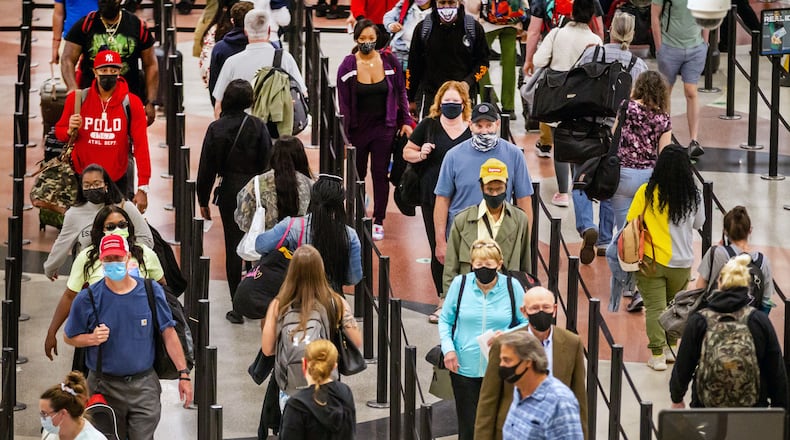The skies are starting to get crowded again.
So are airport security lines. And good luck finding a parking spot at Hartsfield-Jackson International or getting there by Uber. Or snagging a rental car when you land.
Early bottlenecks are exposing the challenges of air travel returning to “normal” after more than a year of the pandemic — and just weeks before Memorial Day, traditionally the start of America’s busy summer travel season.
More than 1.5 million people have passed through U.S. security checkpoints on some days in recent weeks. That’s still down from as many as 2.5 million a day in 2019, but more than eight times higher than a year ago. In a survey published last month by AAA, 44% of respondents in Georgia were comfortable flying again as more people get vaccinated and COVID-19 restrictions are lifted.
“We are starting to see a significant uptick in passengers as people feel more comfortable traveling,” said Balram “B” Bheodari, the Atlanta airport’s interim manager, in a written statement.
Airlines are adding flights to prepare for increased traffic, and fares are on the rise again from record lows during the pandemic. There are also plenty of hotel rooms, often at discount prices.
But fallout from the pandemic is pinching travelers in other ways. That includes the closure of airport park-ride lots to reduce the use of shuttles for social distancing, the sell-off of rental cars after travel shriveled because of stay-at-home protocols, and workforce cutbacks spanning ride shares, security checkpoints and airport restaurants.
Getting to airports and leaving them isn’t always easy. Hartsfield-Jackson began using a new remote parking deck for overflow parking over Easter weekend after the economy lots filled up. Airport-run park-ride lots, another budget option, remain closed.
Those aiming to arrive by Uber or Lyft often have to wait a long time. Uber has offered a $1,000 signup bonus to drivers after losing many due to concerns about safety and lack of demand last year.
A shortage of rental cars has driven rates up to $300 a day or more during peak periods in Atlanta and other places across the country. That’s because rental car agencies, under financial strain when travel plummeted, sold off hundreds of thousands of cars. A global semiconductor shortage has made it hard for auto manufacturers to catch up, prompting some travelers to turn to alternatives like U-Haul trucks, according to news reports.
Inside the airport, security lines are getting longer again after many travelers could pass through in a minute or two at times last year. Checkpoint wait times can now be half an hour or longer during busy periods, and the airport and Transportation Security Administration are recommending travelers arrive two hours early for domestic flights.
“As volume is returning, we also think passenger wait times are going to return to pre-pandemic levels,” said acting TSA administrator Darby LaJoye during a Congressional hearing Wednesday.
The TSA is racing to hire more security officers ahead of the busy summer period, adding hundreds in Atlanta and offering a sign-on bonus of up to $1,000 in other cities at a time when many companies are struggling to hire enough frontline workers as business returns.
The Atlanta airport last year expanded its South security checkpoint to add lanes and allow more space for queuing. Still, with people standing farther apart for social distancing, security lines at the airport are more likely to stretch through the terminal.
Of more than 300 food, retail and service concessions at Hartsfield-Jackson, more than 100 remain closed, including those in closed-off gate areas due to reduced flights. Some of the eateries that are open have long lines, and some have struggled to attract and retain enough workers amid the pandemic.
Atlanta airport officials said it’s up to concessionaires when to reopen. But they also are looking at options for future concessions contracts like vending machines that sell hot food to allow faster service and distancing.
CNN Airport Network no longer blares from screens throughout airports. The network shut down airport programming nationwide at the end of March, and Hartsfield-Jackson replaced it with in-house infomercials until it gets a new contractor in place.
There are still hand sanitizer stations and plexiglass shields around the airport, but Delta Air Lines is removing some distancing stickers on airport floors.
Credit: Steve Schaefer
Credit: Steve Schaefer
The in-air experience is also changing. Planes are getting more crowded and Delta began selling middle seats again on May 1, becoming the last major airline to lift that restriction. Delta, the dominant carrier at Hartsfield-Jackson, also is restoring some of its in-flight snack and beverage service.
Airlines are expanding flights as demand increases, including Delta, which is adding routes to open-air destinations in Michigan, South Dakota and Maine along with the Caribbean. International trips remain limited due to travel restrictions.
Airline fares are expected to rise 12% into summer, though still remaining 10% to 20% lower than 2019 levels from May through August, according to a forecast from travel app Hopper.
Hotels are in recovery mode as well, filling more rooms with prices rising to more than 90% of 2019 levels in some categories. That still means plenty of available rooms when travelers arrive at their destination, though.
One aspect of the pandemic air travel experience that is not expected to change anytime soon: masks.
The TSA recently extended its mask requirement in airports and on planes through Sept. 13, regardless of vaccination status. Airlines have reported 1,300 incidents involving unruly passengers since February, many of them involving travelers refusing to wear a face covering.
TSA checkpoint traveler counts nationwide
May 6, 2021: 1,644,050
2020: 190,863
2019: 2,555,342
May 5, 2021: 1,268,938
2020: 140,409
2019: 2,270,662
May 4, 2021: 1,134,103
2020: 130,601
2019: 2,106,597
May 3, 2021: 1,463,672
2020: 163,692
2019: 2,470,969
May 2, 2021: 1,626,962
2020: 170,254
2019: 2,512,598
May 1, 2021: 1,335,535
2020: 134,261
2019: 1,968,278
Source: TSA
About the Author
The Latest
Featured



